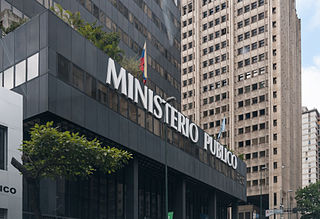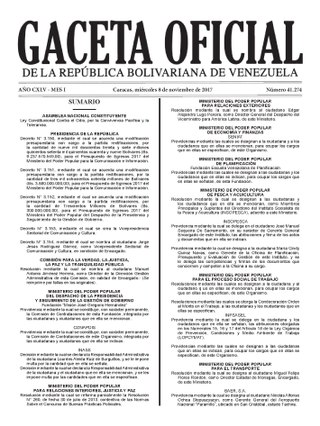
Nicolás Maduro Moros is a Venezuelan politician who has served as the president of Venezuela since 2013.

Luis Moreno Ocampo is an Argentine lawyer who served as the first Prosecutor of the International Criminal Court (ICC) from 2003 to 2012. Previously, he had played a major role in Argentina's democratic transition (1983–1991).

Luis Leonardo Almagro Lemes is a Uruguayan lawyer, diplomat, and politician who currently serves as the 10th Secretary General of the Organization of American States (OAS) since 2015. A former member of the Broad Front, Almagro served as Minister of Foreign Relations of Uruguay from 2010 to 2015 under president José Mujica.

Colectivos are far-left Venezuelan armed paramilitary groups that support the Bolivarian government, the Great Patriotic Pole (GPP) political alliance and Venezuela's ruling party, the United Socialist Party of Venezuela (PSUV). Colectivo has become an umbrella term for irregular armed groups that operate in poverty-stricken areas.

Luisa Marvelia Ortega Díaz is a Venezuelan lawyer. Between December 2007 and August 2017, she served as the Prosecutor General of Venezuela. A proponent of the Chavismo ideology, Ortega Díaz was fired as Prosecutor General on 5 August 2017 by the Supreme Tribunal of Justice and the Constituent National Assembly (ANC) promoted by Nicolás Maduro, following a breaking with the Maduro government as a result of the 2017 Venezuelan constitutional crisis in the context of the crisis in Venezuela. This dismissal was rejected by the opposition-led National Assembly of Venezuela, arguing that only that institution had the power to carry out said removal according to the Constitution, and cataloging the Prosecutor as the only legitimate authority of the Public Ministry. As a result, she is called by the National Assembly, the Supreme Tribunal of Justice of Venezuela in exile and some media outlets as the Prosecutor General of Venezuela in exile.

The Public Ministry of Venezuela is an organ belonging to Citizen Power, it has autonomous and independent character. It is under the direction of the Attorney General of the Republic who is elected by the National Assembly for a period of seven years.

On 29 March 2017, the Supreme Tribunal of Justice (TSJ) of Venezuela took over legislative powers of the National Assembly. The Tribunal, mainly supporters of President Nicolás Maduro, also restricted the immunity granted to the Assembly's members, who mostly belonged to the opposition.

Tamara Sujú Roa is a Venezuelan criminal lawyer and human rights specialist.

Tarek William Saab Halabi is a Venezuelan politician, lawyer and poet. He was a leader of the Fifth Republic Movement (MVR) party founded by Hugo Chávez, President of Venezuela, who publicly called him "The Revolution's Poet". He was the Governor of Anzoátegui from 2004 to 2012, and a member of the Committee for Justice and Truth since 2013. In December 2014, he was elected "People's Defender", or Ombudsman, by the National Assembly for 2014–2021 term. Saab was appointed as President of the Republican Moral Council of Venezuela by the People's Power in 2015. On 5 August 2017, the National Constituent Assembly appointed him as Attorney General in substitution of Luisa Ortega Diaz.
Fernando Alberto Albán Salazar was a Venezuelan–Colombian activist, lawyer, politician, and prominent figure within the Justice First opposition party. Albán served as a councilman of the Libertador Municipality of Caracas from 2012 until his death in office in 2018.

Juan Gerardo Guaidó Márquez is a Venezuelan opposition politician. He belonged to the social-democratic party Popular Will, and was a federal deputy to the National Assembly representing the state of Vargas. On 23 January 2019, Guaidó and the National Assembly declared that he was acting president of Venezuela, starting the Venezuelan presidential crisis by challenging Nicolás Maduro's presidency. In December 2022, opposition parties voted to dismiss Guaidó as interim president, choosing Dinorah Figuera as a successor on 5 January 2023 and ending Guaidó's presidential claim.
The Local Committees for Supply and Production are food distribution committees promoted by the Venezuelan government in which the communities themselves supply and distribute the priority foods through a house-to-house delivery method. It was established in 2016 by President Nicolás Maduro in response to the shortages in Venezuela. The committees have been subject of complaints about corruption, political use, delays, poor food quality and price increases without prior warning. This service is a subsidiary of the Ministry of Popular Power for Food.
Armando.Info is a Venezuelan investigative journalism website that was founded in 2014. Armando.info is a long-term partner of the International Consortium of Investigative Journalists and has worked on many projects, including the Panama Papers and Paradise Papers.
Rafael Ramón Acosta Arévalo was a Venezuelan military officer with the rank of corvette captain of the Venezuela Navy. Acosta Arévalo was victim of forced disappearance and tortured by agents of the General Directorate of Military Counterintelligence (DGCIM) during his detention after being accused by the government of Nicolás Maduro of "conspiring to carry out an attempted coup d'état". Acosta Arévalo died as a result of injuries suffered after being tortured while in detention in the Military Hospital of the Army Dr. Vicente Salias Sanoja. The news of his death caused great impact in the media and the condemnation of both national and international authorities.

Alex Nain Saab Morán is a Colombian businessman. Saab was the subject of journalistic investigations for conducting businesses estimated at US$135 million with the Venezuelan government, while other Colombian businessmen had stopped exporting to Venezuela due to uncertainty regarding payments and tight exchange controls. Saab's name has appeared in multiple ICIJ leaks including the Panama Papers, Pandora Papers and the FinCEN Files.

The Constitutional Law Against Hatred, for Peaceful Coexistence and Tolerance, also known simply as the Law Against Hatred, is a law passed unanimously by the Venezuelan Constituent National Assembly and published in Gaceta Oficial 41,274 on 8 November 2017.

The La Vega raid was a police raid that occurred on 8 January 2021 in La Vega Parish, Caracas, Venezuela. The objective of the raid was to take control of La Vega Parish, which was controlled by a criminal organization, led by Leonardo José Polanco Angulo; he was a drug lord, known as "El Loco Leo". Members of the Venezuelan National Police (PNB), the Special Action Forces (FAES) and the Venezuelan National Guard seized control of the parish, killing a number of people in the neighborhood. According to investigative journalists and human rights organizations, the death toll was 23 people. By 11 January, no member of the Nicolás Maduro administration had made a statement about the events or announced a death toll.

The International Criminal Court investigation in Ukraine or the Situation in Ukraine is an ongoing investigation by the Prosecutor of the International Criminal Court (ICC) into "any past and present allegations of war crimes, crimes against humanity or genocide committed on any part of the territory of Ukraine by any person" during the period starting "from 21 November 2013 onwards", on an "open-ended basis", covering the Revolution of Dignity, the Russo-Ukrainian War including the 2014 annexation of Crimea by Russia, the war in Donbas and the 2022 Russian invasion of Ukraine. The ICC prosecutor commenced these investigations on 2 March 2022, after receiving referrals for the situation in Ukraine from 39 ICC State Parties.
Olga Lucila Mata de Gil is a Venezuelan woman detained in April 2022 for recording a humorous video posted on the social network TikTok in which she names arepas after high-ranking government officials.
Orlando Figuera Esparragoza was a young Venezuelan attacked during the 2017 protests in the country. Before his death, Orlando blamed the attack on a group of people who were feuding with him for work-related reasons: "Malandrín"; "Pecas"; "Menor"; "Oriental" and "Mono". The day after Orlando Figuera's death, Attorney General Luisa Ortega Díaz denied that Figuera was the victim of a hate crime or attacked for being a Chavista, as alleged by the government version. As of 2022, no person has been tried for Figuera's murder.















